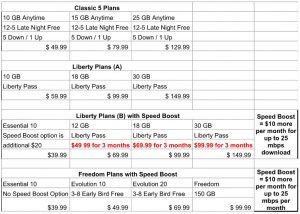Rural Internet Service Providers Guide

Internet service subscriptions are sold in metropolitan areas and suburbs based on their throughput speeds alone. Out beyond the suburbs and into the rural market, internet service providers sell subscriptions as blocks of data with a limiting data cap on each plan.

Internet service subscriptions are sold in metropolitan areas and suburbs based on their throughput speeds alone. Out beyond the suburbs and into the rural market, providers sell subscriptions as blocks of data with a limiting data cap on each plan.
Our Rhoonet ISP guide covers the top 10 regional and national ISPs throughout the United States and Canada. Alternatively, we have also compiled a list of local fixed wireless, DSL, and T1 providers, separated by state, in our
Rural ISP Directory.

Since there are inherent geographic challenges (mountains, valleys, etc.) in providing Internet access to rural areas, users may experience vast differences in quality of service from a provider depending on their location. In places, both satellite and mobile broadband can be finicky, which is why, on online forums, rural users give Internet providers almost universally negative reviews.
Because customer satisfaction varies so drastically with location (and, in the wrong location, can be so negative), we decided to exclude online feedback from the list. When choosing a rural Internet provider, look for reviews or recommendations from users in your geographic area. Good local service is key.
The internet service providers listed below use satellites or radio towers to reach users who live, work, or travel out of range of traditional cable and DSL Internet providers. Each bio summarizes the extent of the provider’s coverage, its legal obligations on the user, and its service and hardware costs as of publication.
We invite listed internet service providers to send us updated information about their services directly.
The First Step: Choosing Between Mobile Broadband and Satellite Internet
Before deciding on a particular provider, rural users must decide if they want to purchase mobile broadband or satellite internet. Here’s a quick summary of each service’s capabilities:
Mobile Broadband
Downlink: 5-12 Mbps (4G LTE), 1-4 Mbps (3G)
Uplink: 2-5 Mbps (4G LTE), 1 Mbps (3G)
Latency: 75-100 ms
Cost: $50-$60/10GB/month
Mobile broadband connects subscribers to the Internet by transmitting radio waves through the cellular network. It can either be installed on a device (like a smartphone, tablet, hotspot, or laptop with a built-in wireless modem) or installed on an external modem that provides Wi-Fi to an entire residence.
PROS: The user experience of a good mobile broadband connection is faster than the user experience of satellite internet because mobile broadband has a shorter latency.
Gaming and video streaming are smoother on mobile broadband than satellite.
CONS: Mobile broadband throughput speeds vary drastically based on the strength of the signal the user receives from the nearest tower. Unlike satellite, which a user can install almost anywhere on earth and get a decent signal, a mobile broadband signal is finicky.
Satellite Internet
Download speed: 5-15 Mbps
Upload speed: 1-2 Mbps
Latency: 500-1500 ms
Cost: $50-$90/month
Satellite Internet connects subscribers through orbiting satellites. If you have trouble getting a signal on your cellphone in your home, satellite is a more reasonable option than mobile broadband. Note that, although satellite Internet providers advertise impressive speeds, the user experience will be slower due to high latency.
PROS: Decent throughputs (in theory more decent than mobile broadband) make file sharing with satellite easy. For any internet task that doesn’t require a real-time response, satellite is effective and, GB for GB, typically less expensive. You can download some large files and watch video from services like Netflix™ with no issues
on your satellite internet product. However, keep an eye on your capped bandwidth consumptions.
CONS: For online gamers, satellite internet is not a viable choice because a latency of up to 1500 ms equals a mean lag time. It is nearly impossible to play real-time games like first-person shooters, on a satellite connection.

Satellite Internet Solutions
Dishnet™
DISH’s satellite internet service, Dishnet, provides Internet access to users anywhere in the United States that has a clear view of the Southern sky (where its satellites orbit).
A service contract with Dishnet lasts 24-months. It has a graduated early termination fee (ETF) of up to $420.00 and an unreturned equipment fee (UEF) of $200.00 [1]. Dishnet charges the UEF only if the customer does not return their satellite modem and TRIA within 30 days of cancelling service.
The three Dishnet plans offer between 10 GB and 50 GB of “anytime data” – data that can be used any hour of the day [2]. Every plan also includes 50 GB of “off-peak data” –data that can only be used between 2:00 PM and 8:00. If a user exceeds his or her monthly data limit, Dishnet reduces the connection speed from 10 Mbps download to 256 Kbps or less.
Dishnet is oft lauded as the best value in satellite Internet. Indeed, with plans that cost between $39.99 and $69.99 (plus a $10.00 monthly equipment fee), Dishnet is the most affordable nationwide satellite Internet service.
Dishnet Summary
Technology: Satellite
Coverage areas: National
Plans: $39.99 (10 GB) to $69.99 (50 GB) per month
Hardware cost: $10.00 per month to lease equipment
Cancellation fee: Up to $420.00 (depending on the remaining length of contract)
Disclosure customer needs to pay attention to: Beware the unreturned equipment fee (UEF) of $200.00.
Pros: Best value in satellite
Cons: High latency, of course
HughesNet™
HughesNet provides satellite Internet access to users in the United States, Brazil, Europe, and India. In the United States, HughesNet’s broadband service is available in any location with a clear view of the Southern sky (where HughesNet’s satellites orbit).
A service contract with HughesNet lasts 24-months. It has a graduated early termination fee (ETF) of up to $400.00 and an unreturned equipment fee (UEF) of $300.00. HughesNet refunds UEFs for users who, after terminating service, return their modem, power supply, and radio transmitter in working condition.
HughesNet has a complicated data allowance system. Each plan has a daily data allowance of between 250 and 850 MB [1]. Each day is separated into two periods. For the period between 2:00 PM and 8:00 AM the monthly data allowance is 50 GB, for remaining period the monthly allowance ranges from 5 to 50 GB [2].
Satellite Internet through HughesNet costs between $49.00 and $89.00 per month [3].
HughesNet Summary
Technology: Satellite
Coverage areas: National
Plans: $49.00 (5 GB) and $89.00 (50 GB) per month
Hardware cost: $10.00 per month to lease equipment
Cancellation fee: Up to $400.00 (depending on the remaining length of contract)
Disclosure customer needs to pay attention to: Beware the unreturned equipment fee (UEF) of $300.00.
Pros: Most popular satellite provider in the United States
Cons: Higher costs than budget satellite
Wildblue™
Wildblue™ provides satellite Internet access to users across the United States. Wildblue™ is owned by communications conglomerate ViaSat™, which provides high-speed broadband satellite to both commercial and military markets.
A service contract with Wildblue™ lasts 24-months and has a graduated early termination fee (ETF) of up to $345.00. Wildblue™ charges an activation fee of $149.00 and an equipmentlease fee of $9.99 per month [1]. Installation is, however, free.
Wildblue Monthly Subscription Plan Table

In 2011, ViaSat introduced Exede, a high-speed alternative to the original Wildblue Internet service. Exede can reach speeds of up to 12 Mbps, eight times faster than ViaSat’s original satellite service. ViaSat now uses Wildblue to sell Exede to eligible customers. (Exede is currently less available than original Wildblue but, for those in qualifying locations, is typically a better purchase).
Satellite Internet through Wildblue/Exede costs between $39.99 and $149.99 per month.
Wildblue Summary
Technology: Satellite
Coverage areas: National
Plans: $39.99 (10 GB) to $149.99 (30 GB) per month
Hardware cost: $10.00 per month to lease equipment
Cancellation fee: Up to $345.00 (depending on the remaining length of contract)
Disclosure customer needs to pay attention to: Activation fee of $149.00
Pros: Fastest satellite on the market
Cons: Pricey
Mobile Broadband
AT&T (EVDO)
Communications giant AT&T provides mobile broadband to users in the United States and Puerto Rico through its 4G LTE, 4G, 3G, and 2G networks (sold as home internet through U-Verse). Combined, AT&T’s networks cover 99% of Americans. AT&T’s 4G LTE network, its fastest, is available to 93% of Americans [1].
Depending on the devices connected to an account, AT&T services come without a contract, with a two-year contract, or with a prepay. To use AT&T through EVDO you must have an air card in your device and a router in your home.
According to an oft-cited RootMetrics study, AT&T boasts the fastest 4G LTE speeds of any mobile Internet provider – it downloads data at an average of 18.6 Mbps. The same study found, however, that AT&T’s 4G LTE was a little unreliable – one in five attempts to connect to the LTE in areas that were supposedly covered failed.
Mobile broadband through AT&T costs between $20.00 (for 300 MB) and $375.00 (for 50 GB) per month. Alternatively, AT&T offers home internet through U-Verse for $35.00 to $55.00 per month when bundled with phone and television services.
AT&T Summary
Technology: Mobile broadband
Coverage areas: National
Plans: From $20.00 (for 300 MB) to $375.00 (for 50 GB) per month
Hardware cost: Free for mobile devices/$7.00 per month to lease home equipment through U-Verse
Cancellation fee: Up to $325.00 (depending on the remaining length of contract)
Disclosure customer needs to pay attention to: Beware the $150 unreturned equipment fee with U-Verse.
Pros: Fast mobile broadband speeds
Cons: U-Verse home internet must be bundled with other services
DigitalPath
DigitalPath provides broadband internet access to users in Northern California. Like mobile providers, DigitalPath uses radio waves to transmit online data through local towers.
DigitalPath’s users sign a 12-month contract. After a 30-day grace period, DigitalPath applies an early termination fee (ETF) of an undisclosed amount. Installation and warranty for the equipment (owned and maintained by DigitalPath) costs $249.00. If the equipment is damaged as a result of the user, he or she is liable to pay a $200.00 fee [1].
DigitalPath offers five residential Internet plans, which range from a $62.95 per month plan with download speeds of up to 6 Mbps to a $102.95 plan with download speeds of up to 20 Mbps [2]. DigitalPath has a liberal heavy use policy which defines heavy use as five times the user average. This means DigitalPath does not throttle residential users until they use more than 300 GB per month.
DigitalPath offers nine business Internet plans, which range from a $99.95 per month plan with download speeds of up to 6 Mbps to a $799.95 plan with download speeds of up to 10 Mbps [3]. DigitalPath claims that its “Dedicated Business Plans” are as reliable as T1.
DigitalPath Summary
Technology: Mobile broadband
Coverage areas: National
Plans: From $62.95 per month (downlink of 6 Mbps) to $102.95 plan (downlink of 20 Mbps)
Hardware cost: Installation and warranty for the equipment (owned and maintained by DigitalPath) costs $249.00.
Cancellation fee: Undisclosed
Disclosure customer needs to pay attention to: Beware the $200 unreturned/damaged equipment fee.
Pros: Fast mobile broadband speeds
Cons: U-Verse home internet must be bundled with other services
Rise Broadband™
Rise Broadband (which operated regionally as Digis, Prairie-iNet, Skybeam, T6 and Rhino Communications until the company rebranded in 2015) provides mobile broadband to 200,000 homes and businesses in 16 states in the rural and suburban Midwest, the Mountain States, and the American Southwest.
Like mobile providers, Rise Broadband uses radio waves to transmit online data through local towers. Unlike mobile providers, Rise Broadbandis focused solely on Internet access for homes and businesses (fixed mobile broadband).
New customers must accept a service agreement of at least one year. If the customer terminates service, Rise Broadband charges an early termination fee (ETF) of $250 or the remaining portion of the contract. If the customer fails to return the equipment within 30 days, a minimum unreturned equipment fee (UEF) of at least $300
(1) The monthly costs of Rise Broadband’s plans correspond with the graduated speeds the plans deliver and the monthly data allowance. The provider’s download speeds vary from 2 Mbps to 15 Mbps
Rise Broadband’s fastest speeds (15 Mbps downlink) are comparable to today’s 4G LTE.
[1].The monthly costs of Rise Broadband’s plans correspond with the graduated speeds the plans deliver and the monthly data allowance. The provider’s download speeds vary from 2 Mbps to 15 Mbps [2].
Rise Broadband’s fastest speeds (15 Mbps downlink) are comparable to today’s 4G LTE.Rise Broadband costs between $40 and $60 per month for residential customers [3] and between $59.95 and $109.95 per month for small businesses [4].
Rise Broadband Summary
Technology: Mobile broadband
Coverage areas: Sixteen states in the rural and suburban Midwest, the Mountain States, and the American Southwest
Plans: Between $40 and $60 per month for residential customers and between $59.95 and $109.95 per month for small businesses
Hardware cost: Installation and warranty for the equipment (owned and maintained by DigitalPath) costs $249.00.
Cancellation fee: $250 or the remaining portion of the contract
Disclosure customer needs to pay attention to: Beware the minimum unreturned equipment fee (UEF) of $300.
Pros: Local focus, business plans
Cons: Limited to particular states
Sprint (EVDO)
Sprint provides mobile broadband to users in the United States, Puerto Rico, and the U.S. Virgin Islandsthrough its 4G LTE, 4G, 3G, and 2G networks. Compared to Verizon and AT&T, Sprint’s rural coverage is lacking. The mountain states and the west coast, in particular, lack ideal coverage [1]. Sprint’s 4G LTE network, its fastest, is available to 80% of Americans [2].
Depending on the devices connected to an account, Sprint’s services come without a contract, with a two-year contract, or with a prepay. To use Sprint through EVDO requires a skycard and a router.
According to a RootMetrics study, at an average speed of 10.3 Mbps Sprint’s 4G LTEis significantly faster than its relatively slow 4G, 3G, and 2G networks [3]. Sprint’s prices are alsomore affordable than any other national carrier. This means that, for users in a location that does have access to Sprint’s 4G LTE, the service can be an excellent value.
Mobile broadband through Sprint costs between $10.00 (for 100 MB) and $110.00 (for 30 GB) per month [4].
Sprint Summary
Technology: Mobile broadband
Coverage areas: National
Plans: Between $10.00 (for 100 MB) and $110.00 (for 30 GB) per month
Hardware cost: Customer supplies aircard/router
Cancellation fee: Up to $350 per line
Disclosure customer needs to pay attention to: Sprint lacks a solidified home internet plan with particular legal stipulations, so beware ambiguity.
Pros: One of the more affordable mobile broadband options
Cons: Sprint no longer markets home internet as a product, although third-party vendors still advertise it through their businesses.
Verizon (EVDO)
Verizon provides mobile broadband to users in the United States and Puerto Rico through its 4G LTE, 3G, and 2G networks. Combined, Verizon’s networks cover 99% of Americans. Verizon’s 4G LTE network, its fastest, is available to 98% of Americans [1].
Verizon 4G LTE Internet comes with a two-year contract and a graduated early termination fee (ETF) of up to $350.00. To use Verizon through EVDO requires an air card and a router, which Verizon provides for free.
Verizon finished at the top of a series of tests done by RootMetrics at the end of 2014. Of the four national carriers, Verizon is best in overall performance, best in network reliability, best in overall networks speed, and best in data and call performance [2]. Coverage is crucial for rural users and, as RootMetrics proves, Verizon has the strongest 4G LTE network in the United States.
Mobile broadband through Verizon costs between $60.00 (for 10 GB) and $120.00 (for 30 GB) per month [3].
Verizon Summary
Technology: Mobile broadband
Coverage areas: National, Puerto Rico
Plans: Between $60.00 (for 10 GB) and $120.00 (for 30 GB) per month
Hardware cost: Free
Cancellation fee: Up to $350 (depending on the remaining length of contract)
Disclosure customer needs to pay attention to: Overage fees of $10.00 – $15.00 per GB
Pros: Reliable service in most areas
Cons: Verizon coverage can get pricey





